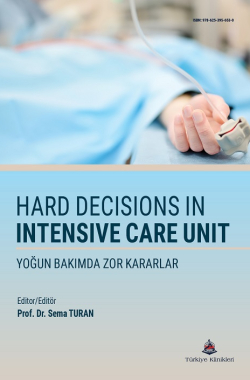ETHICS AND DECISION MAKING PROCESSES
Seval Kılbasanlı
Ömer Halisdemir University, Faculty of Medicine, Department of Anesthesiology and Reanimation, Niğde, Türkiye
Kılbasanlı S. Ethics and Decision Making Processes. In: Turan S, editor. Hard Decisions in Intensive Care Unit. 1st ed. Ankara: Türkiye Klinikleri; 2025. p.553-560.
ABSTRACT
Intensive care units are one of the healthcare settings where ethically complex decisions are frequently encountered. Issues such as end-of-life care, equitable distribution of resources, patient autonomy, and patient-family expectations form the basis of ethical dilemmas in intensive care. This chapter discusses ethical decision-making processes in intensive care through basic ethical principles and solutions.
Ethical decision-making processes are based on four fundamental principles: autonomy, beneficence, nonmaleficence, and justice. Autonomy refers to the right of patients to make their own health decisions. However, this principle is difficult to apply in intensive care because the patient is unconscious or incapable of making decisions. The principle of beneficence aims at patient recovery, while the principle of nonmaleficence requires healthcare professionals to avoid unnecessary or harmful treatments. The principle of justice ensures the fair distribution of limited resources and is supported by prioritization systems in crises.
A multidisciplinary approach is important in ethical decision-making processes in intensive care. Teams of doctors, nurses, social workers, and ethics consultants provide more balanced decision-making. In addition, ethics committees provide guidance and impartial assessments to healthcare professionals in complex situations. Ethical guidelines and protocols standardize decision-making processes, while case studies help workers make more informed decisions when faced with similar ethical dilemmas.
Cultural and religious factors can be decisive in ethical decision-making processes. Sensitiveness to the patient’s cultural and individual values strengthens the patient-family relationship. Cultural awareness training for healthcare professionals plays an important role in preventing ethical conflicts. In addition, technological solutions such as digital decision support systems can provide speed and efficiency in decision-making processes.
In conclusion, providing ethical guidance in intensive care improves the quality of patient care and contributes to healthcare professionals’ fulfillment of ethical responsibilities. Strategies such as continuous education, guideline updates, and ethics committee consultation are recommended to increase the effectiveness of these processes.
Keywords: Intensive care; Ethical decision-making; Multidisciplinary approach; Patient autonomy; Ethics committee; Ethical guideline
Kaynak Göster
Referanslar
- Beauchamp TL, Childress JF. Principles of Biomedical Ethics. 7th ed. New York, NY: Oxford University Press; 2013. Accessed January 30, 2025. [Link]
- Truog RD, Campbell ML, Curtis JR, Haas CE, Luce JM, Rushton CH, et al. Recommendations for end-oflife care in the intensive care unit: A consensus statement by the American College of Critical Care Medicine. Crit Care Med. 2008;36(3):953-963. Accessed January 30, 2025. [Crossref] [PubMed]
- Bosslet GT, Pope TM, Rubenfeld GD, Lo B, Truog RD, Rushton CH, et al. An Official ATS/AACN/ACCP/ESICM/SCCM Policy Statement: Responding to requests for potentially inappropriate treatments in intensive care units. Am J Respir Crit Care Med. 2015;191(11):1318-1330. Accessed January 30, 2025. [Crossref] [PubMed]
- Emanuel EJ, Persad G, Upshur R, Thome B, Parker M, Glickman A, et al. Fair allocation of scarce medical resources in the time of Covid-19. N Engl J Med. 2020;382(21):2049-2055. Accessed January 30, 2025. [Crossref] [PubMed]
- Gatrad AR, Sheikh A. Medical ethics and Islam: Principles and practice. Arch Dis Child. 2001;84(1):72-75. Accessed January 30, 2025. [Crossref] [PubMed] [PMC]
- Kon AA. The shared decision-making continuum. JAMA. 2010;304(8):903-904. Accessed January 30, 2025. [Crossref] [PubMed]
- Schneiderman LJ, Gilmer T, Teetzel HD, Wiley JF, Luce JM, Morrison RS, et al. Effect of ethics consultations on nonbeneficial life-sustaining treatments in the intensive care setting: A randomized controlled trial. JAMA. 2003;290(9):1166-1172. Accessed January 30, 2025. [Crossref] [PubMed]
- White DB, Pope TM. The persistent failure of advanced care planning in the intensive care unit: The urgent need for a new paradigm. JAMA. 2015;313(3):215-216. Accessed January 30, 2025. [Link]
- Curtis JR, White DB. Practical guidance for evidence-based ICU family conferences. Chest. 2008;134(4):835-843. Accessed January 30, 2025. [Crossref] [PubMed] [PMC]
- Padela AI, Curlin FA. Religion and disagreement in the endof-life care of Muslims. J Palliat Med. 2013;16(1):36-39. Accessed January 30, 2025. [Link]
- Betancourt JR, Green AR, Carrillo JE, Ananeh-Firempong O. Defining cultural competence: A practical framework for addressing racial/ethnic disparities in health and health care. Public Health Rep. 2003;118(4):293-302. Accessed January 30, 2025. [Crossref] [PubMed]
- White DB, Braddock CH, Bereknyei S, Curtis JR, Luce JM, Lo B, et al. Toward shared decision making at the end of life in intensive care units: Opportunities for improvement. Arch Intern Med. 2007;167(5):461-467. Accessed January 30, 2025. [Crossref] [PubMed]

